OB Report: Influence of Power, Culture, and Politics on Performance
VerifiedAdded on 2020/10/23
|18
|4599
|263
Report
AI Summary
This report delves into organizational behavior, examining the influence of power, culture, and politics on individual and team performance within a telecommunications firm, 4 Com PLC. It analyzes the impact of power distribution, task culture, and the role of HR in managing these dynamics. The report further evaluates content and process theories of motivation, including Maslow's hierarchy of needs and Vroom's expectancy theory, assessing their effectiveness in achieving organizational goals. It explores the application of these theories within the firm, detailing how 4 Com PLC addresses employee needs and incentives. Additionally, the report analyzes the characteristics of effective and ineffective teams, discussing group development theories to support dynamic cooperation within the organization. Finally, it evaluates the concepts and philosophies of organizational behavior and their impact on individual behavior within the workplace.
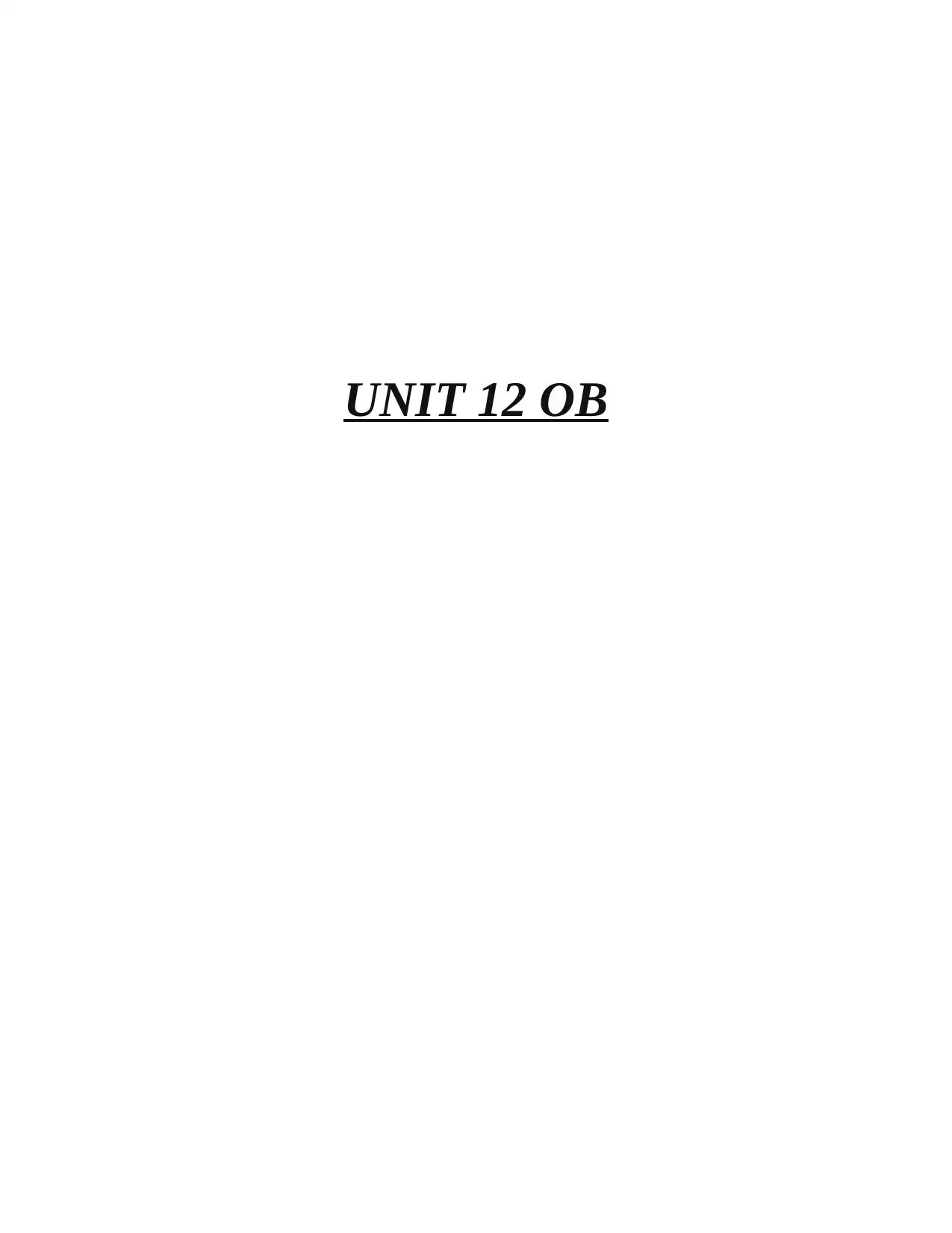
UNIT 12 OB
Paraphrase This Document
Need a fresh take? Get an instant paraphrase of this document with our AI Paraphraser
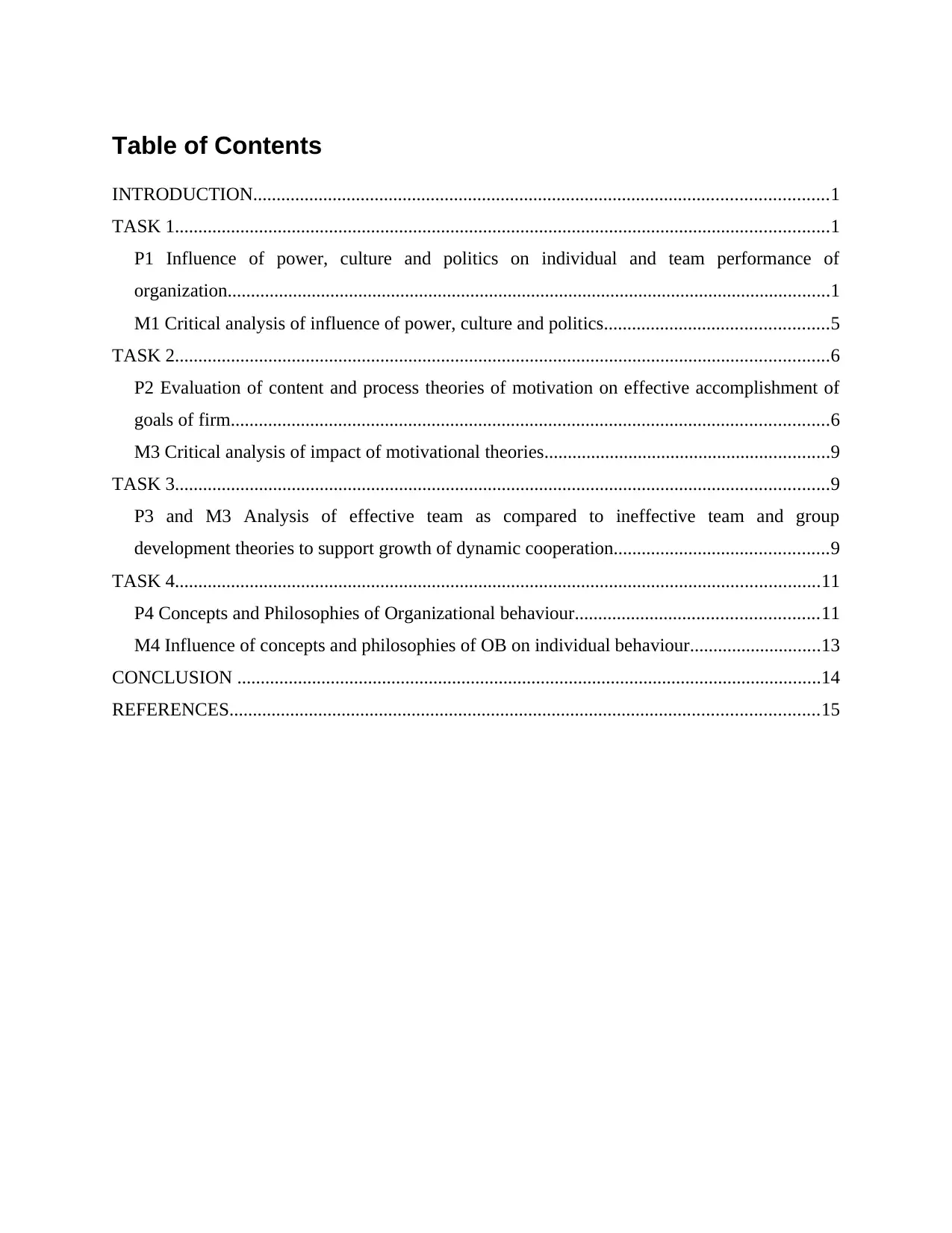
Table of Contents
INTRODUCTION...........................................................................................................................1
TASK 1............................................................................................................................................1
P1 Influence of power, culture and politics on individual and team performance of
organization.................................................................................................................................1
M1 Critical analysis of influence of power, culture and politics................................................5
TASK 2............................................................................................................................................6
P2 Evaluation of content and process theories of motivation on effective accomplishment of
goals of firm................................................................................................................................6
M3 Critical analysis of impact of motivational theories.............................................................9
TASK 3............................................................................................................................................9
P3 and M3 Analysis of effective team as compared to ineffective team and group
development theories to support growth of dynamic cooperation..............................................9
TASK 4..........................................................................................................................................11
P4 Concepts and Philosophies of Organizational behaviour....................................................11
M4 Influence of concepts and philosophies of OB on individual behaviour............................13
CONCLUSION .............................................................................................................................14
REFERENCES..............................................................................................................................15
INTRODUCTION...........................................................................................................................1
TASK 1............................................................................................................................................1
P1 Influence of power, culture and politics on individual and team performance of
organization.................................................................................................................................1
M1 Critical analysis of influence of power, culture and politics................................................5
TASK 2............................................................................................................................................6
P2 Evaluation of content and process theories of motivation on effective accomplishment of
goals of firm................................................................................................................................6
M3 Critical analysis of impact of motivational theories.............................................................9
TASK 3............................................................................................................................................9
P3 and M3 Analysis of effective team as compared to ineffective team and group
development theories to support growth of dynamic cooperation..............................................9
TASK 4..........................................................................................................................................11
P4 Concepts and Philosophies of Organizational behaviour....................................................11
M4 Influence of concepts and philosophies of OB on individual behaviour............................13
CONCLUSION .............................................................................................................................14
REFERENCES..............................................................................................................................15
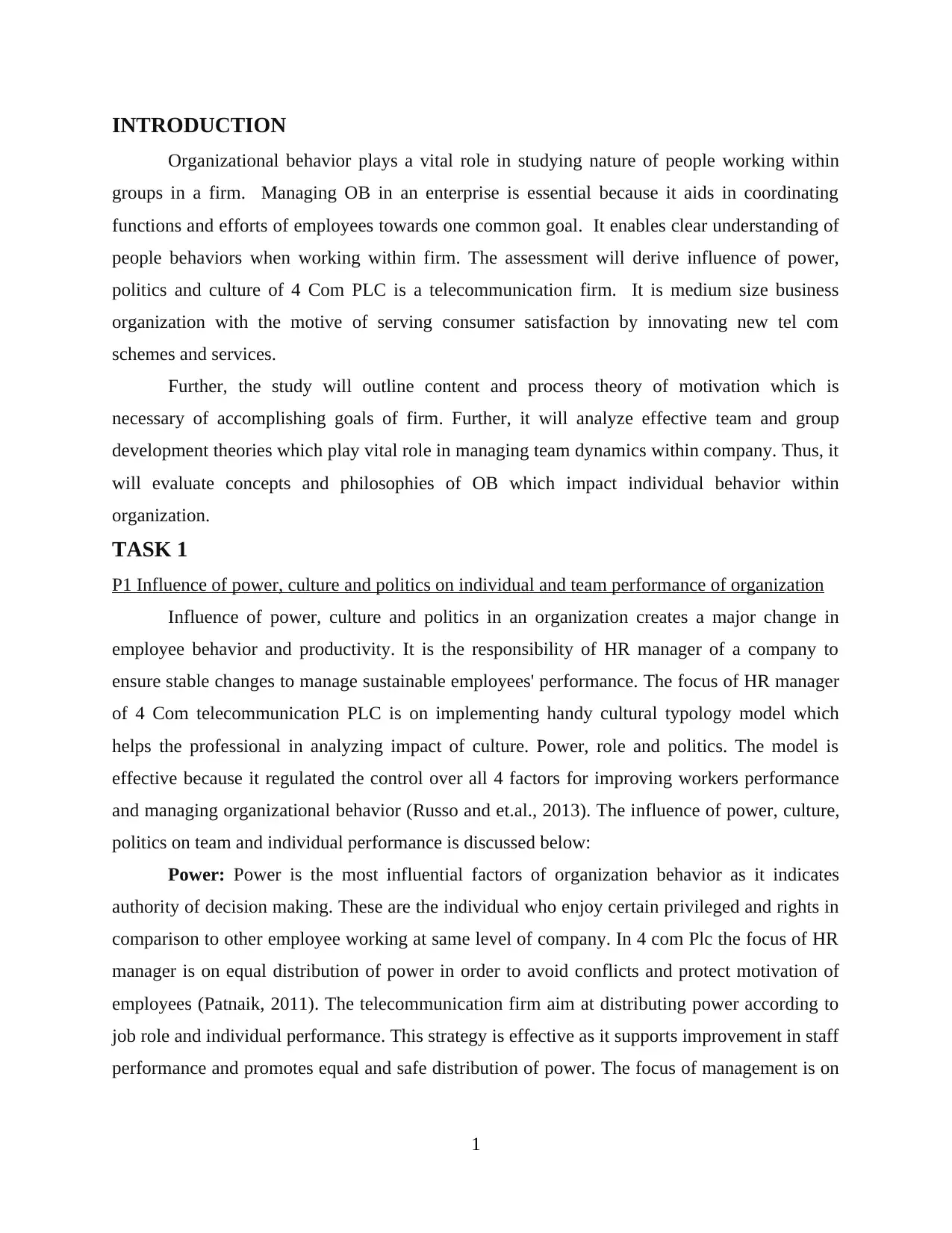
INTRODUCTION
Organizational behavior plays a vital role in studying nature of people working within
groups in a firm. Managing OB in an enterprise is essential because it aids in coordinating
functions and efforts of employees towards one common goal. It enables clear understanding of
people behaviors when working within firm. The assessment will derive influence of power,
politics and culture of 4 Com PLC is a telecommunication firm. It is medium size business
organization with the motive of serving consumer satisfaction by innovating new tel com
schemes and services.
Further, the study will outline content and process theory of motivation which is
necessary of accomplishing goals of firm. Further, it will analyze effective team and group
development theories which play vital role in managing team dynamics within company. Thus, it
will evaluate concepts and philosophies of OB which impact individual behavior within
organization.
TASK 1
P1 Influence of power, culture and politics on individual and team performance of organization
Influence of power, culture and politics in an organization creates a major change in
employee behavior and productivity. It is the responsibility of HR manager of a company to
ensure stable changes to manage sustainable employees' performance. The focus of HR manager
of 4 Com telecommunication PLC is on implementing handy cultural typology model which
helps the professional in analyzing impact of culture. Power, role and politics. The model is
effective because it regulated the control over all 4 factors for improving workers performance
and managing organizational behavior (Russo and et.al., 2013). The influence of power, culture,
politics on team and individual performance is discussed below:
Power: Power is the most influential factors of organization behavior as it indicates
authority of decision making. These are the individual who enjoy certain privileged and rights in
comparison to other employee working at same level of company. In 4 com Plc the focus of HR
manager is on equal distribution of power in order to avoid conflicts and protect motivation of
employees (Patnaik, 2011). The telecommunication firm aim at distributing power according to
job role and individual performance. This strategy is effective as it supports improvement in staff
performance and promotes equal and safe distribution of power. The focus of management is on
1
Organizational behavior plays a vital role in studying nature of people working within
groups in a firm. Managing OB in an enterprise is essential because it aids in coordinating
functions and efforts of employees towards one common goal. It enables clear understanding of
people behaviors when working within firm. The assessment will derive influence of power,
politics and culture of 4 Com PLC is a telecommunication firm. It is medium size business
organization with the motive of serving consumer satisfaction by innovating new tel com
schemes and services.
Further, the study will outline content and process theory of motivation which is
necessary of accomplishing goals of firm. Further, it will analyze effective team and group
development theories which play vital role in managing team dynamics within company. Thus, it
will evaluate concepts and philosophies of OB which impact individual behavior within
organization.
TASK 1
P1 Influence of power, culture and politics on individual and team performance of organization
Influence of power, culture and politics in an organization creates a major change in
employee behavior and productivity. It is the responsibility of HR manager of a company to
ensure stable changes to manage sustainable employees' performance. The focus of HR manager
of 4 Com telecommunication PLC is on implementing handy cultural typology model which
helps the professional in analyzing impact of culture. Power, role and politics. The model is
effective because it regulated the control over all 4 factors for improving workers performance
and managing organizational behavior (Russo and et.al., 2013). The influence of power, culture,
politics on team and individual performance is discussed below:
Power: Power is the most influential factors of organization behavior as it indicates
authority of decision making. These are the individual who enjoy certain privileged and rights in
comparison to other employee working at same level of company. In 4 com Plc the focus of HR
manager is on equal distribution of power in order to avoid conflicts and protect motivation of
employees (Patnaik, 2011). The telecommunication firm aim at distributing power according to
job role and individual performance. This strategy is effective as it supports improvement in staff
performance and promotes equal and safe distribution of power. The focus of management is on
1
⊘ This is a preview!⊘
Do you want full access?
Subscribe today to unlock all pages.

Trusted by 1+ million students worldwide
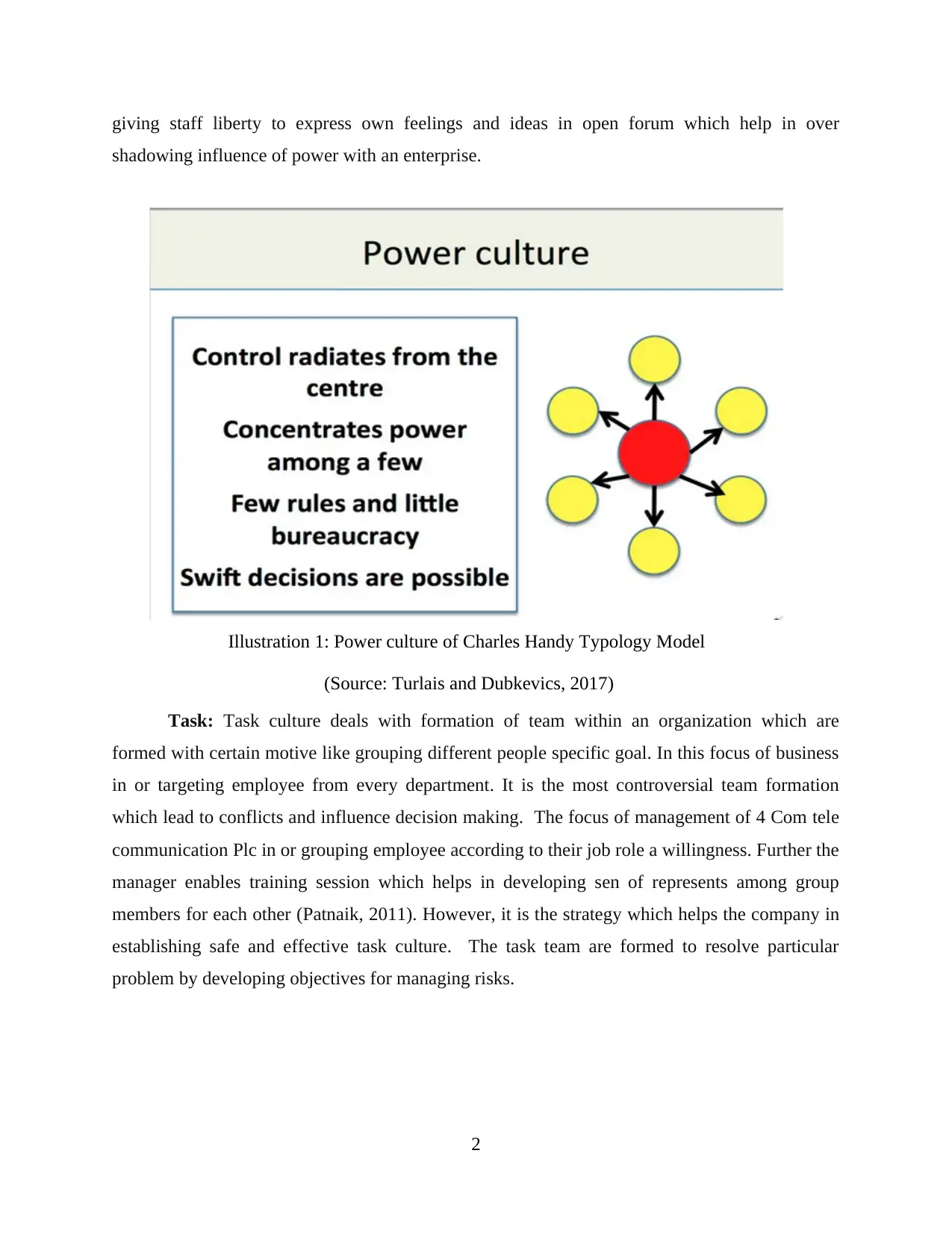
giving staff liberty to express own feelings and ideas in open forum which help in over
shadowing influence of power with an enterprise.
Task: Task culture deals with formation of team within an organization which are
formed with certain motive like grouping different people specific goal. In this focus of business
in or targeting employee from every department. It is the most controversial team formation
which lead to conflicts and influence decision making. The focus of management of 4 Com tele
communication Plc in or grouping employee according to their job role a willingness. Further the
manager enables training session which helps in developing sen of represents among group
members for each other (Patnaik, 2011). However, it is the strategy which helps the company in
establishing safe and effective task culture. The task team are formed to resolve particular
problem by developing objectives for managing risks.
2
Illustration 1: Power culture of Charles Handy Typology Model
(Source: Turlais and Dubkevics, 2017)
shadowing influence of power with an enterprise.
Task: Task culture deals with formation of team within an organization which are
formed with certain motive like grouping different people specific goal. In this focus of business
in or targeting employee from every department. It is the most controversial team formation
which lead to conflicts and influence decision making. The focus of management of 4 Com tele
communication Plc in or grouping employee according to their job role a willingness. Further the
manager enables training session which helps in developing sen of represents among group
members for each other (Patnaik, 2011). However, it is the strategy which helps the company in
establishing safe and effective task culture. The task team are formed to resolve particular
problem by developing objectives for managing risks.
2
Illustration 1: Power culture of Charles Handy Typology Model
(Source: Turlais and Dubkevics, 2017)
Paraphrase This Document
Need a fresh take? Get an instant paraphrase of this document with our AI Paraphraser
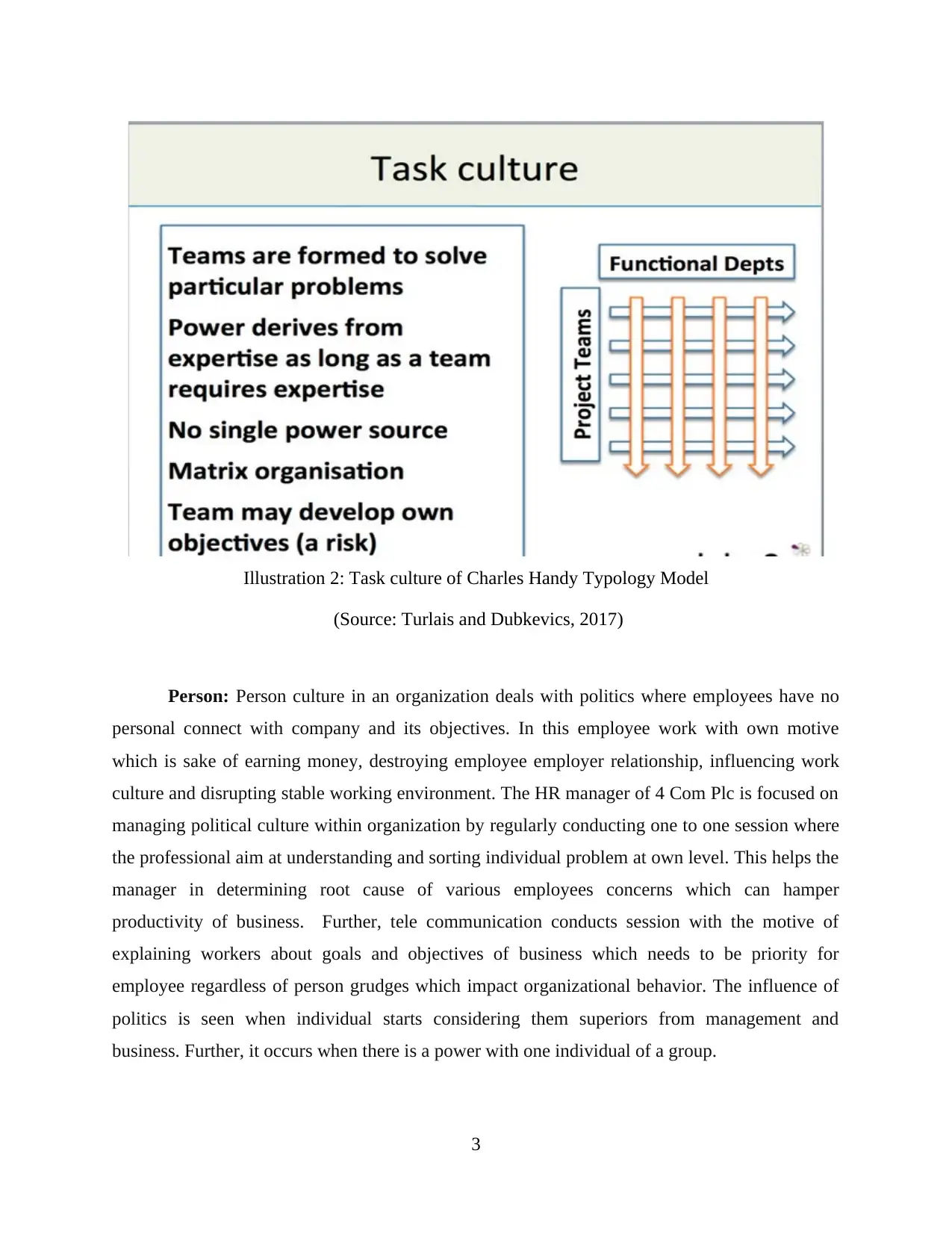
Person: Person culture in an organization deals with politics where employees have no
personal connect with company and its objectives. In this employee work with own motive
which is sake of earning money, destroying employee employer relationship, influencing work
culture and disrupting stable working environment. The HR manager of 4 Com Plc is focused on
managing political culture within organization by regularly conducting one to one session where
the professional aim at understanding and sorting individual problem at own level. This helps the
manager in determining root cause of various employees concerns which can hamper
productivity of business. Further, tele communication conducts session with the motive of
explaining workers about goals and objectives of business which needs to be priority for
employee regardless of person grudges which impact organizational behavior. The influence of
politics is seen when individual starts considering them superiors from management and
business. Further, it occurs when there is a power with one individual of a group.
3
Illustration 2: Task culture of Charles Handy Typology Model
(Source: Turlais and Dubkevics, 2017)
personal connect with company and its objectives. In this employee work with own motive
which is sake of earning money, destroying employee employer relationship, influencing work
culture and disrupting stable working environment. The HR manager of 4 Com Plc is focused on
managing political culture within organization by regularly conducting one to one session where
the professional aim at understanding and sorting individual problem at own level. This helps the
manager in determining root cause of various employees concerns which can hamper
productivity of business. Further, tele communication conducts session with the motive of
explaining workers about goals and objectives of business which needs to be priority for
employee regardless of person grudges which impact organizational behavior. The influence of
politics is seen when individual starts considering them superiors from management and
business. Further, it occurs when there is a power with one individual of a group.
3
Illustration 2: Task culture of Charles Handy Typology Model
(Source: Turlais and Dubkevics, 2017)
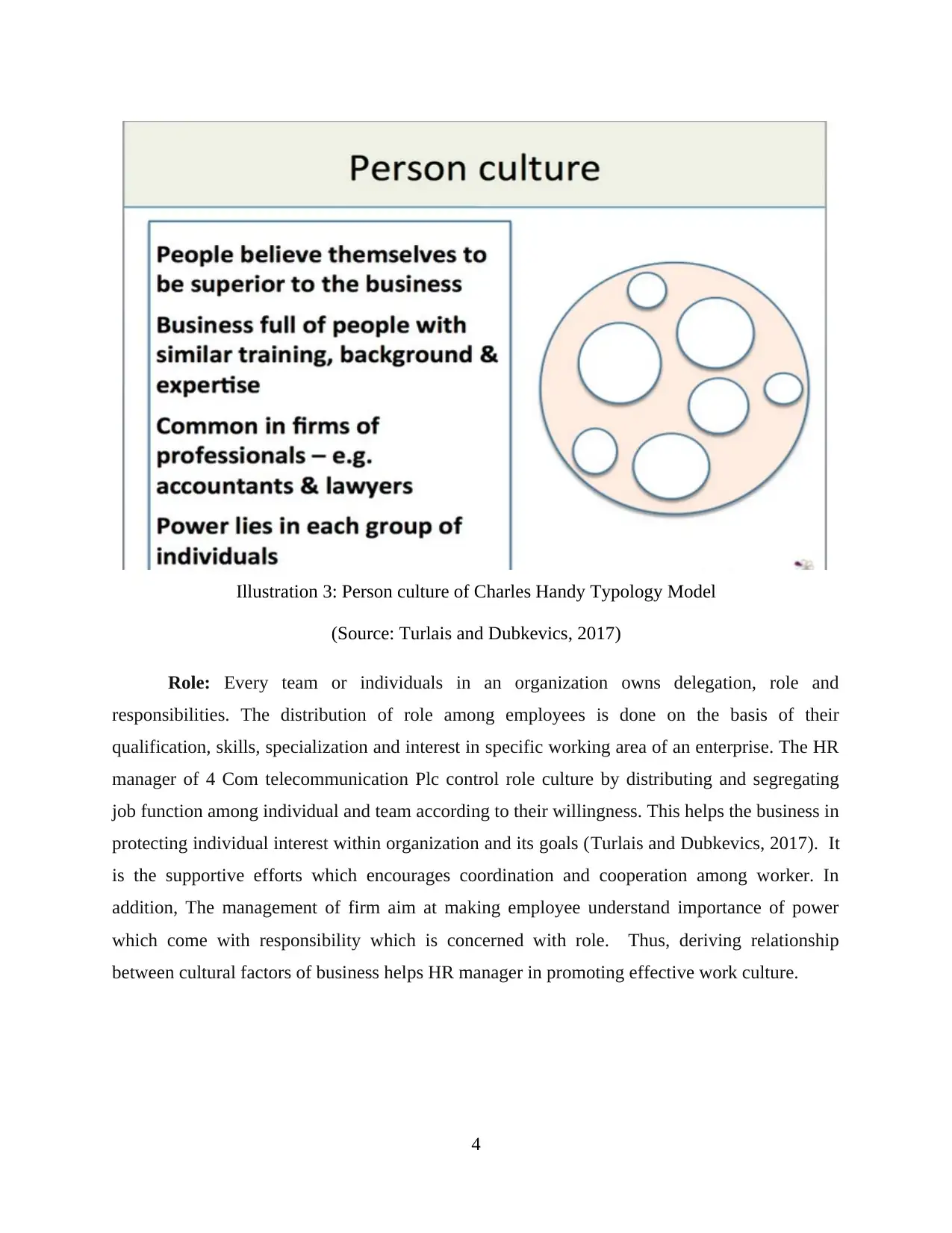
Role: Every team or individuals in an organization owns delegation, role and
responsibilities. The distribution of role among employees is done on the basis of their
qualification, skills, specialization and interest in specific working area of an enterprise. The HR
manager of 4 Com telecommunication Plc control role culture by distributing and segregating
job function among individual and team according to their willingness. This helps the business in
protecting individual interest within organization and its goals (Turlais and Dubkevics, 2017). It
is the supportive efforts which encourages coordination and cooperation among worker. In
addition, The management of firm aim at making employee understand importance of power
which come with responsibility which is concerned with role. Thus, deriving relationship
between cultural factors of business helps HR manager in promoting effective work culture.
4
Illustration 3: Person culture of Charles Handy Typology Model
(Source: Turlais and Dubkevics, 2017)
responsibilities. The distribution of role among employees is done on the basis of their
qualification, skills, specialization and interest in specific working area of an enterprise. The HR
manager of 4 Com telecommunication Plc control role culture by distributing and segregating
job function among individual and team according to their willingness. This helps the business in
protecting individual interest within organization and its goals (Turlais and Dubkevics, 2017). It
is the supportive efforts which encourages coordination and cooperation among worker. In
addition, The management of firm aim at making employee understand importance of power
which come with responsibility which is concerned with role. Thus, deriving relationship
between cultural factors of business helps HR manager in promoting effective work culture.
4
Illustration 3: Person culture of Charles Handy Typology Model
(Source: Turlais and Dubkevics, 2017)
⊘ This is a preview!⊘
Do you want full access?
Subscribe today to unlock all pages.

Trusted by 1+ million students worldwide
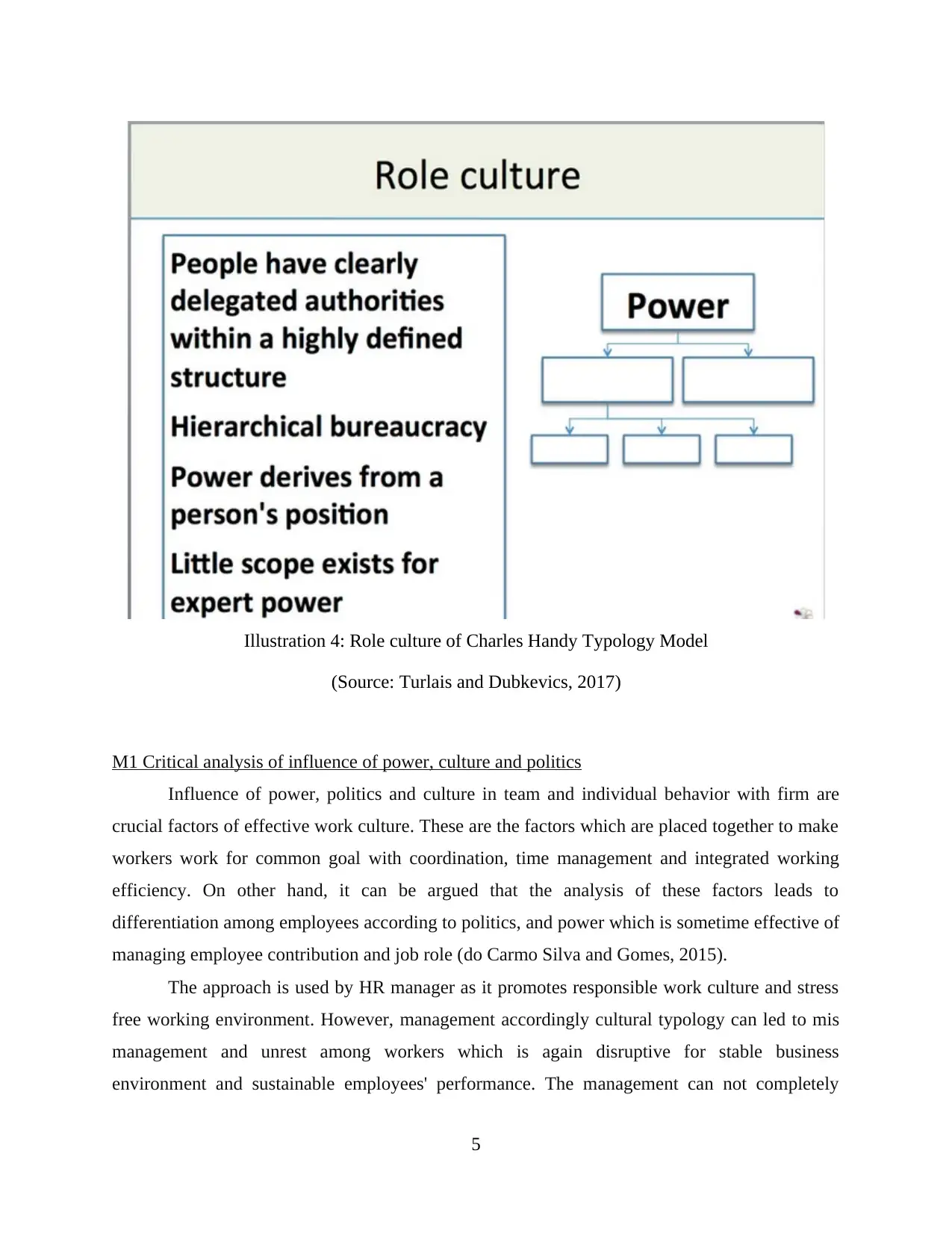
M1 Critical analysis of influence of power, culture and politics
Influence of power, politics and culture in team and individual behavior with firm are
crucial factors of effective work culture. These are the factors which are placed together to make
workers work for common goal with coordination, time management and integrated working
efficiency. On other hand, it can be argued that the analysis of these factors leads to
differentiation among employees according to politics, and power which is sometime effective of
managing employee contribution and job role (do Carmo Silva and Gomes, 2015).
The approach is used by HR manager as it promotes responsible work culture and stress
free working environment. However, management accordingly cultural typology can led to mis
management and unrest among workers which is again disruptive for stable business
environment and sustainable employees' performance. The management can not completely
5
Illustration 4: Role culture of Charles Handy Typology Model
(Source: Turlais and Dubkevics, 2017)
Influence of power, politics and culture in team and individual behavior with firm are
crucial factors of effective work culture. These are the factors which are placed together to make
workers work for common goal with coordination, time management and integrated working
efficiency. On other hand, it can be argued that the analysis of these factors leads to
differentiation among employees according to politics, and power which is sometime effective of
managing employee contribution and job role (do Carmo Silva and Gomes, 2015).
The approach is used by HR manager as it promotes responsible work culture and stress
free working environment. However, management accordingly cultural typology can led to mis
management and unrest among workers which is again disruptive for stable business
environment and sustainable employees' performance. The management can not completely
5
Illustration 4: Role culture of Charles Handy Typology Model
(Source: Turlais and Dubkevics, 2017)
Paraphrase This Document
Need a fresh take? Get an instant paraphrase of this document with our AI Paraphraser
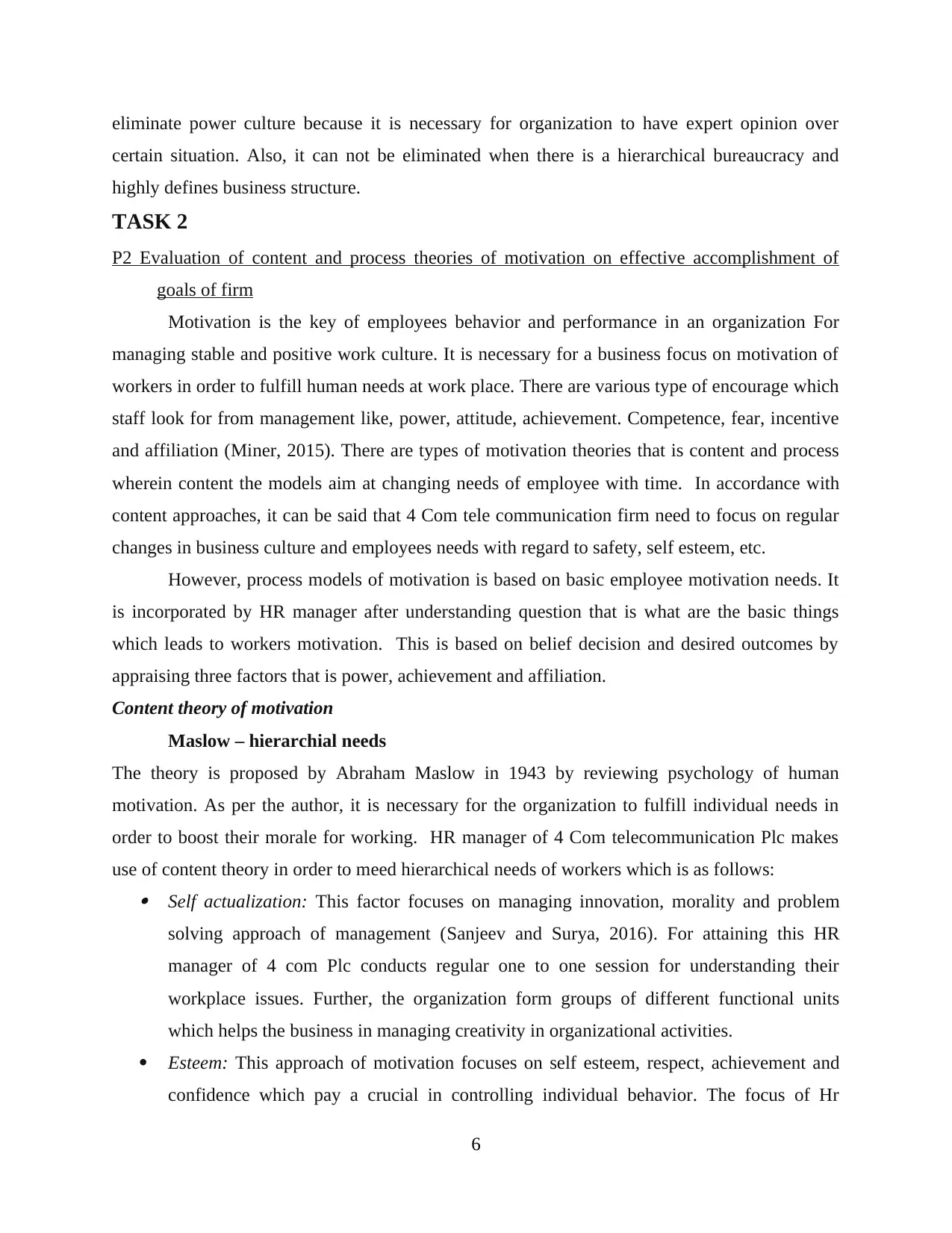
eliminate power culture because it is necessary for organization to have expert opinion over
certain situation. Also, it can not be eliminated when there is a hierarchical bureaucracy and
highly defines business structure.
TASK 2
P2 Evaluation of content and process theories of motivation on effective accomplishment of
goals of firm
Motivation is the key of employees behavior and performance in an organization For
managing stable and positive work culture. It is necessary for a business focus on motivation of
workers in order to fulfill human needs at work place. There are various type of encourage which
staff look for from management like, power, attitude, achievement. Competence, fear, incentive
and affiliation (Miner, 2015). There are types of motivation theories that is content and process
wherein content the models aim at changing needs of employee with time. In accordance with
content approaches, it can be said that 4 Com tele communication firm need to focus on regular
changes in business culture and employees needs with regard to safety, self esteem, etc.
However, process models of motivation is based on basic employee motivation needs. It
is incorporated by HR manager after understanding question that is what are the basic things
which leads to workers motivation. This is based on belief decision and desired outcomes by
appraising three factors that is power, achievement and affiliation.
Content theory of motivation
Maslow – hierarchial needs
The theory is proposed by Abraham Maslow in 1943 by reviewing psychology of human
motivation. As per the author, it is necessary for the organization to fulfill individual needs in
order to boost their morale for working. HR manager of 4 Com telecommunication Plc makes
use of content theory in order to meed hierarchical needs of workers which is as follows: Self actualization: This factor focuses on managing innovation, morality and problem
solving approach of management (Sanjeev and Surya, 2016). For attaining this HR
manager of 4 com Plc conducts regular one to one session for understanding their
workplace issues. Further, the organization form groups of different functional units
which helps the business in managing creativity in organizational activities.
Esteem: This approach of motivation focuses on self esteem, respect, achievement and
confidence which pay a crucial in controlling individual behavior. The focus of Hr
6
certain situation. Also, it can not be eliminated when there is a hierarchical bureaucracy and
highly defines business structure.
TASK 2
P2 Evaluation of content and process theories of motivation on effective accomplishment of
goals of firm
Motivation is the key of employees behavior and performance in an organization For
managing stable and positive work culture. It is necessary for a business focus on motivation of
workers in order to fulfill human needs at work place. There are various type of encourage which
staff look for from management like, power, attitude, achievement. Competence, fear, incentive
and affiliation (Miner, 2015). There are types of motivation theories that is content and process
wherein content the models aim at changing needs of employee with time. In accordance with
content approaches, it can be said that 4 Com tele communication firm need to focus on regular
changes in business culture and employees needs with regard to safety, self esteem, etc.
However, process models of motivation is based on basic employee motivation needs. It
is incorporated by HR manager after understanding question that is what are the basic things
which leads to workers motivation. This is based on belief decision and desired outcomes by
appraising three factors that is power, achievement and affiliation.
Content theory of motivation
Maslow – hierarchial needs
The theory is proposed by Abraham Maslow in 1943 by reviewing psychology of human
motivation. As per the author, it is necessary for the organization to fulfill individual needs in
order to boost their morale for working. HR manager of 4 Com telecommunication Plc makes
use of content theory in order to meed hierarchical needs of workers which is as follows: Self actualization: This factor focuses on managing innovation, morality and problem
solving approach of management (Sanjeev and Surya, 2016). For attaining this HR
manager of 4 com Plc conducts regular one to one session for understanding their
workplace issues. Further, the organization form groups of different functional units
which helps the business in managing creativity in organizational activities.
Esteem: This approach of motivation focuses on self esteem, respect, achievement and
confidence which pay a crucial in controlling individual behavior. The focus of Hr
6
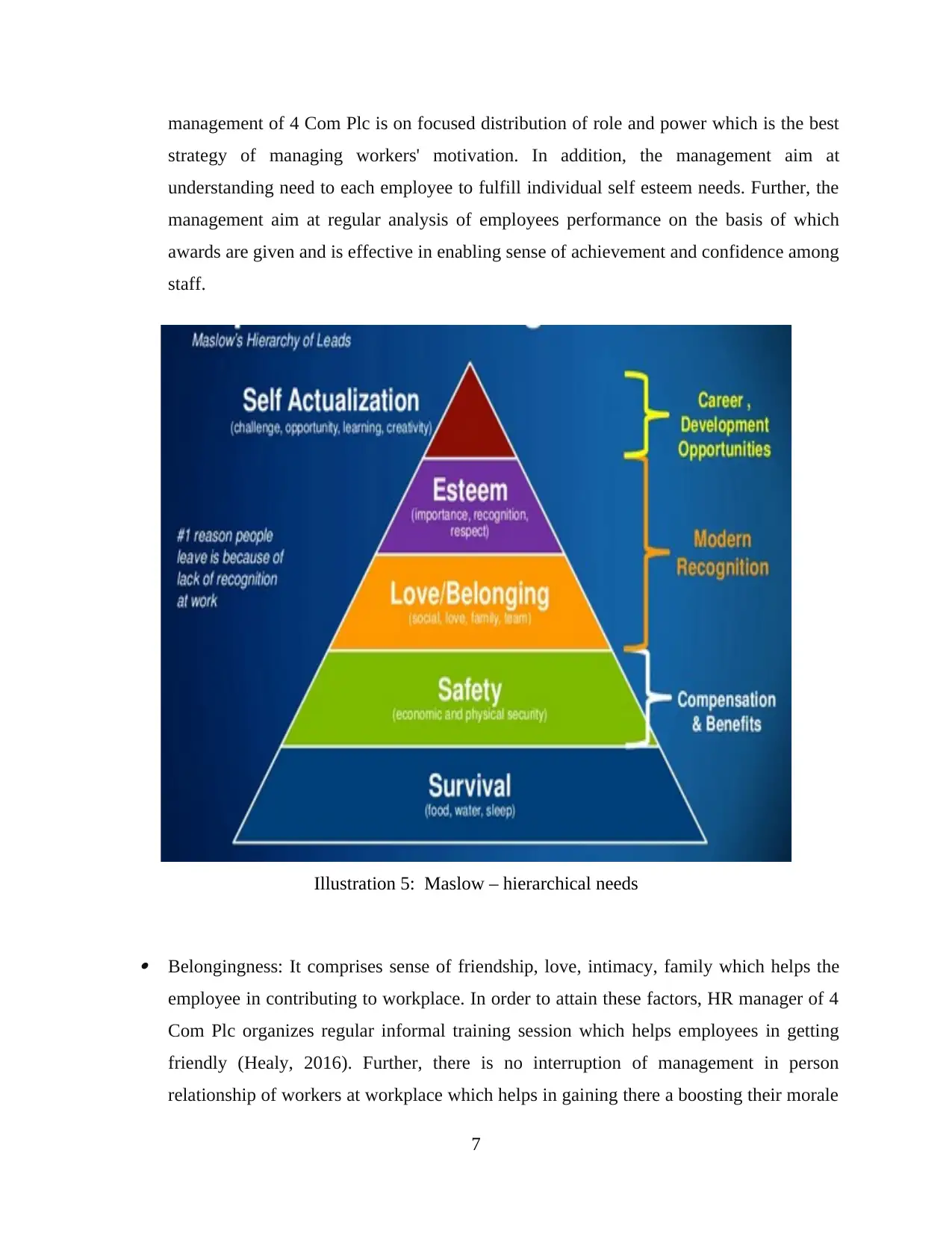
management of 4 Com Plc is on focused distribution of role and power which is the best
strategy of managing workers' motivation. In addition, the management aim at
understanding need to each employee to fulfill individual self esteem needs. Further, the
management aim at regular analysis of employees performance on the basis of which
awards are given and is effective in enabling sense of achievement and confidence among
staff.
Belongingness: It comprises sense of friendship, love, intimacy, family which helps the
employee in contributing to workplace. In order to attain these factors, HR manager of 4
Com Plc organizes regular informal training session which helps employees in getting
friendly (Healy, 2016). Further, there is no interruption of management in person
relationship of workers at workplace which helps in gaining there a boosting their morale
7
Illustration 5: Maslow – hierarchical needs
strategy of managing workers' motivation. In addition, the management aim at
understanding need to each employee to fulfill individual self esteem needs. Further, the
management aim at regular analysis of employees performance on the basis of which
awards are given and is effective in enabling sense of achievement and confidence among
staff.
Belongingness: It comprises sense of friendship, love, intimacy, family which helps the
employee in contributing to workplace. In order to attain these factors, HR manager of 4
Com Plc organizes regular informal training session which helps employees in getting
friendly (Healy, 2016). Further, there is no interruption of management in person
relationship of workers at workplace which helps in gaining there a boosting their morale
7
Illustration 5: Maslow – hierarchical needs
⊘ This is a preview!⊘
Do you want full access?
Subscribe today to unlock all pages.

Trusted by 1+ million students worldwide
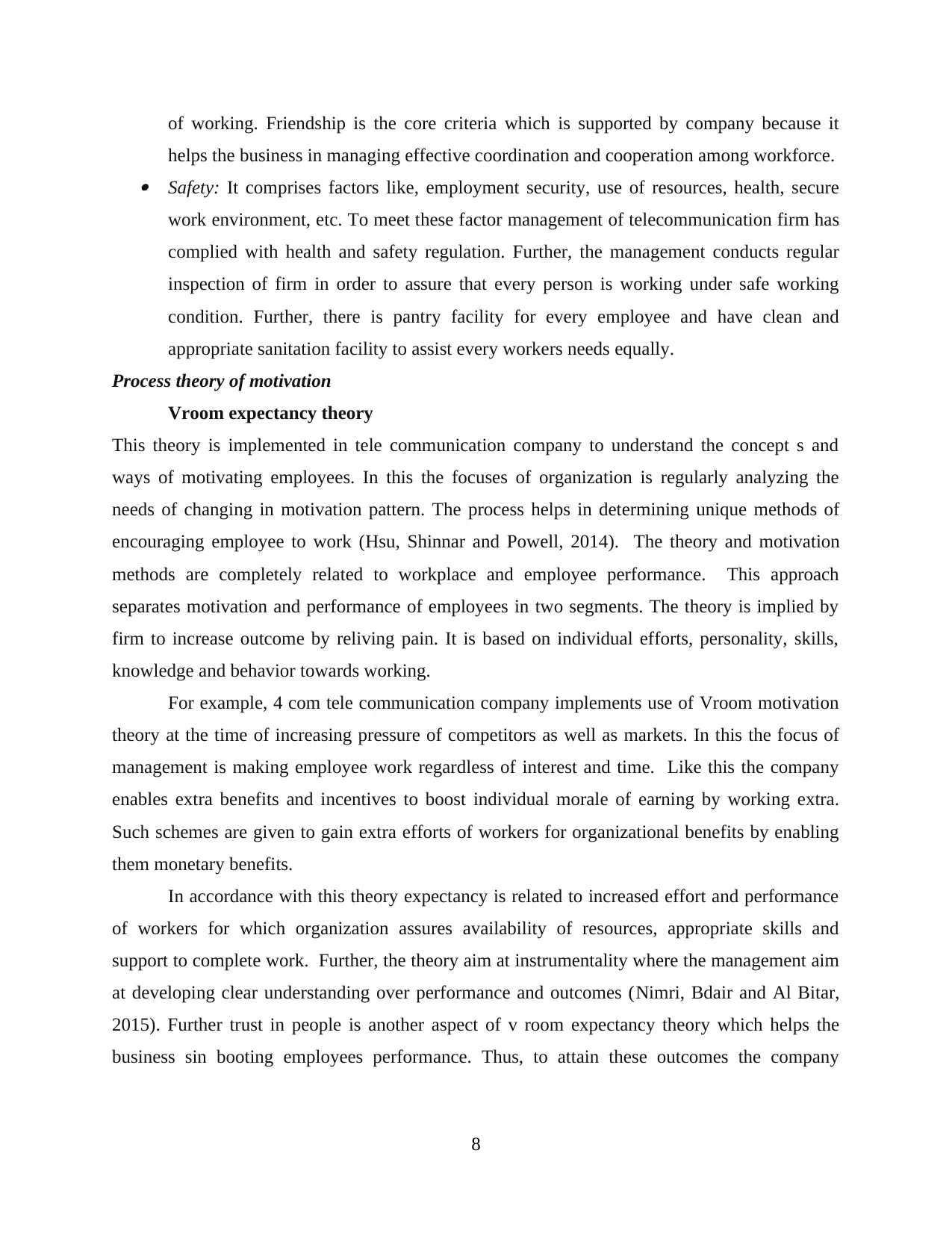
of working. Friendship is the core criteria which is supported by company because it
helps the business in managing effective coordination and cooperation among workforce. Safety: It comprises factors like, employment security, use of resources, health, secure
work environment, etc. To meet these factor management of telecommunication firm has
complied with health and safety regulation. Further, the management conducts regular
inspection of firm in order to assure that every person is working under safe working
condition. Further, there is pantry facility for every employee and have clean and
appropriate sanitation facility to assist every workers needs equally.
Process theory of motivation
Vroom expectancy theory
This theory is implemented in tele communication company to understand the concept s and
ways of motivating employees. In this the focuses of organization is regularly analyzing the
needs of changing in motivation pattern. The process helps in determining unique methods of
encouraging employee to work (Hsu, Shinnar and Powell, 2014). The theory and motivation
methods are completely related to workplace and employee performance. This approach
separates motivation and performance of employees in two segments. The theory is implied by
firm to increase outcome by reliving pain. It is based on individual efforts, personality, skills,
knowledge and behavior towards working.
For example, 4 com tele communication company implements use of Vroom motivation
theory at the time of increasing pressure of competitors as well as markets. In this the focus of
management is making employee work regardless of interest and time. Like this the company
enables extra benefits and incentives to boost individual morale of earning by working extra.
Such schemes are given to gain extra efforts of workers for organizational benefits by enabling
them monetary benefits.
In accordance with this theory expectancy is related to increased effort and performance
of workers for which organization assures availability of resources, appropriate skills and
support to complete work. Further, the theory aim at instrumentality where the management aim
at developing clear understanding over performance and outcomes (Nimri, Bdair and Al Bitar,
2015). Further trust in people is another aspect of v room expectancy theory which helps the
business sin booting employees performance. Thus, to attain these outcomes the company
8
helps the business in managing effective coordination and cooperation among workforce. Safety: It comprises factors like, employment security, use of resources, health, secure
work environment, etc. To meet these factor management of telecommunication firm has
complied with health and safety regulation. Further, the management conducts regular
inspection of firm in order to assure that every person is working under safe working
condition. Further, there is pantry facility for every employee and have clean and
appropriate sanitation facility to assist every workers needs equally.
Process theory of motivation
Vroom expectancy theory
This theory is implemented in tele communication company to understand the concept s and
ways of motivating employees. In this the focuses of organization is regularly analyzing the
needs of changing in motivation pattern. The process helps in determining unique methods of
encouraging employee to work (Hsu, Shinnar and Powell, 2014). The theory and motivation
methods are completely related to workplace and employee performance. This approach
separates motivation and performance of employees in two segments. The theory is implied by
firm to increase outcome by reliving pain. It is based on individual efforts, personality, skills,
knowledge and behavior towards working.
For example, 4 com tele communication company implements use of Vroom motivation
theory at the time of increasing pressure of competitors as well as markets. In this the focus of
management is making employee work regardless of interest and time. Like this the company
enables extra benefits and incentives to boost individual morale of earning by working extra.
Such schemes are given to gain extra efforts of workers for organizational benefits by enabling
them monetary benefits.
In accordance with this theory expectancy is related to increased effort and performance
of workers for which organization assures availability of resources, appropriate skills and
support to complete work. Further, the theory aim at instrumentality where the management aim
at developing clear understanding over performance and outcomes (Nimri, Bdair and Al Bitar,
2015). Further trust in people is another aspect of v room expectancy theory which helps the
business sin booting employees performance. Thus, to attain these outcomes the company
8
Paraphrase This Document
Need a fresh take? Get an instant paraphrase of this document with our AI Paraphraser
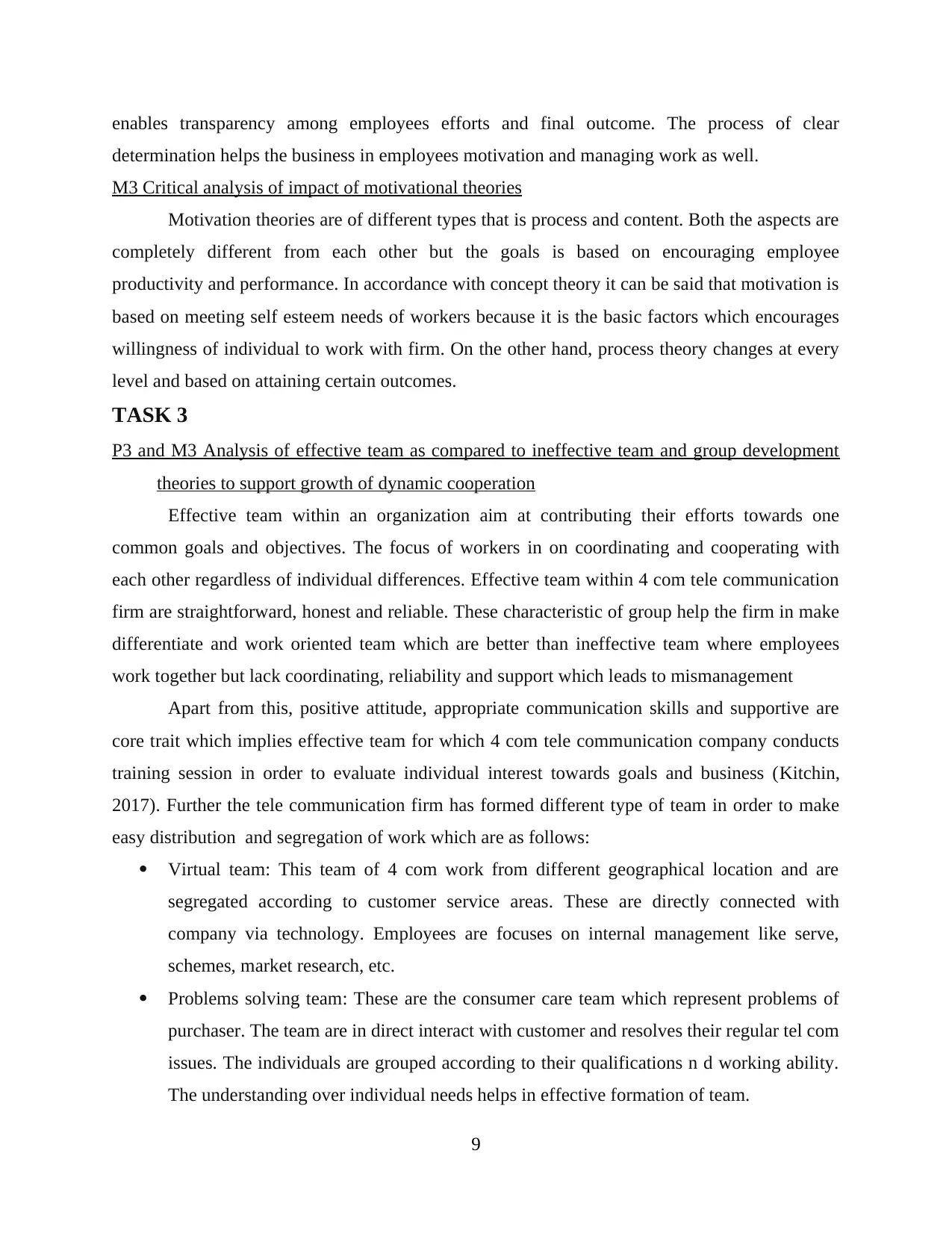
enables transparency among employees efforts and final outcome. The process of clear
determination helps the business in employees motivation and managing work as well.
M3 Critical analysis of impact of motivational theories
Motivation theories are of different types that is process and content. Both the aspects are
completely different from each other but the goals is based on encouraging employee
productivity and performance. In accordance with concept theory it can be said that motivation is
based on meeting self esteem needs of workers because it is the basic factors which encourages
willingness of individual to work with firm. On the other hand, process theory changes at every
level and based on attaining certain outcomes.
TASK 3
P3 and M3 Analysis of effective team as compared to ineffective team and group development
theories to support growth of dynamic cooperation
Effective team within an organization aim at contributing their efforts towards one
common goals and objectives. The focus of workers in on coordinating and cooperating with
each other regardless of individual differences. Effective team within 4 com tele communication
firm are straightforward, honest and reliable. These characteristic of group help the firm in make
differentiate and work oriented team which are better than ineffective team where employees
work together but lack coordinating, reliability and support which leads to mismanagement
Apart from this, positive attitude, appropriate communication skills and supportive are
core trait which implies effective team for which 4 com tele communication company conducts
training session in order to evaluate individual interest towards goals and business (Kitchin,
2017). Further the tele communication firm has formed different type of team in order to make
easy distribution and segregation of work which are as follows:
Virtual team: This team of 4 com work from different geographical location and are
segregated according to customer service areas. These are directly connected with
company via technology. Employees are focuses on internal management like serve,
schemes, market research, etc.
Problems solving team: These are the consumer care team which represent problems of
purchaser. The team are in direct interact with customer and resolves their regular tel com
issues. The individuals are grouped according to their qualifications n d working ability.
The understanding over individual needs helps in effective formation of team.
9
determination helps the business in employees motivation and managing work as well.
M3 Critical analysis of impact of motivational theories
Motivation theories are of different types that is process and content. Both the aspects are
completely different from each other but the goals is based on encouraging employee
productivity and performance. In accordance with concept theory it can be said that motivation is
based on meeting self esteem needs of workers because it is the basic factors which encourages
willingness of individual to work with firm. On the other hand, process theory changes at every
level and based on attaining certain outcomes.
TASK 3
P3 and M3 Analysis of effective team as compared to ineffective team and group development
theories to support growth of dynamic cooperation
Effective team within an organization aim at contributing their efforts towards one
common goals and objectives. The focus of workers in on coordinating and cooperating with
each other regardless of individual differences. Effective team within 4 com tele communication
firm are straightforward, honest and reliable. These characteristic of group help the firm in make
differentiate and work oriented team which are better than ineffective team where employees
work together but lack coordinating, reliability and support which leads to mismanagement
Apart from this, positive attitude, appropriate communication skills and supportive are
core trait which implies effective team for which 4 com tele communication company conducts
training session in order to evaluate individual interest towards goals and business (Kitchin,
2017). Further the tele communication firm has formed different type of team in order to make
easy distribution and segregation of work which are as follows:
Virtual team: This team of 4 com work from different geographical location and are
segregated according to customer service areas. These are directly connected with
company via technology. Employees are focuses on internal management like serve,
schemes, market research, etc.
Problems solving team: These are the consumer care team which represent problems of
purchaser. The team are in direct interact with customer and resolves their regular tel com
issues. The individuals are grouped according to their qualifications n d working ability.
The understanding over individual needs helps in effective formation of team.
9
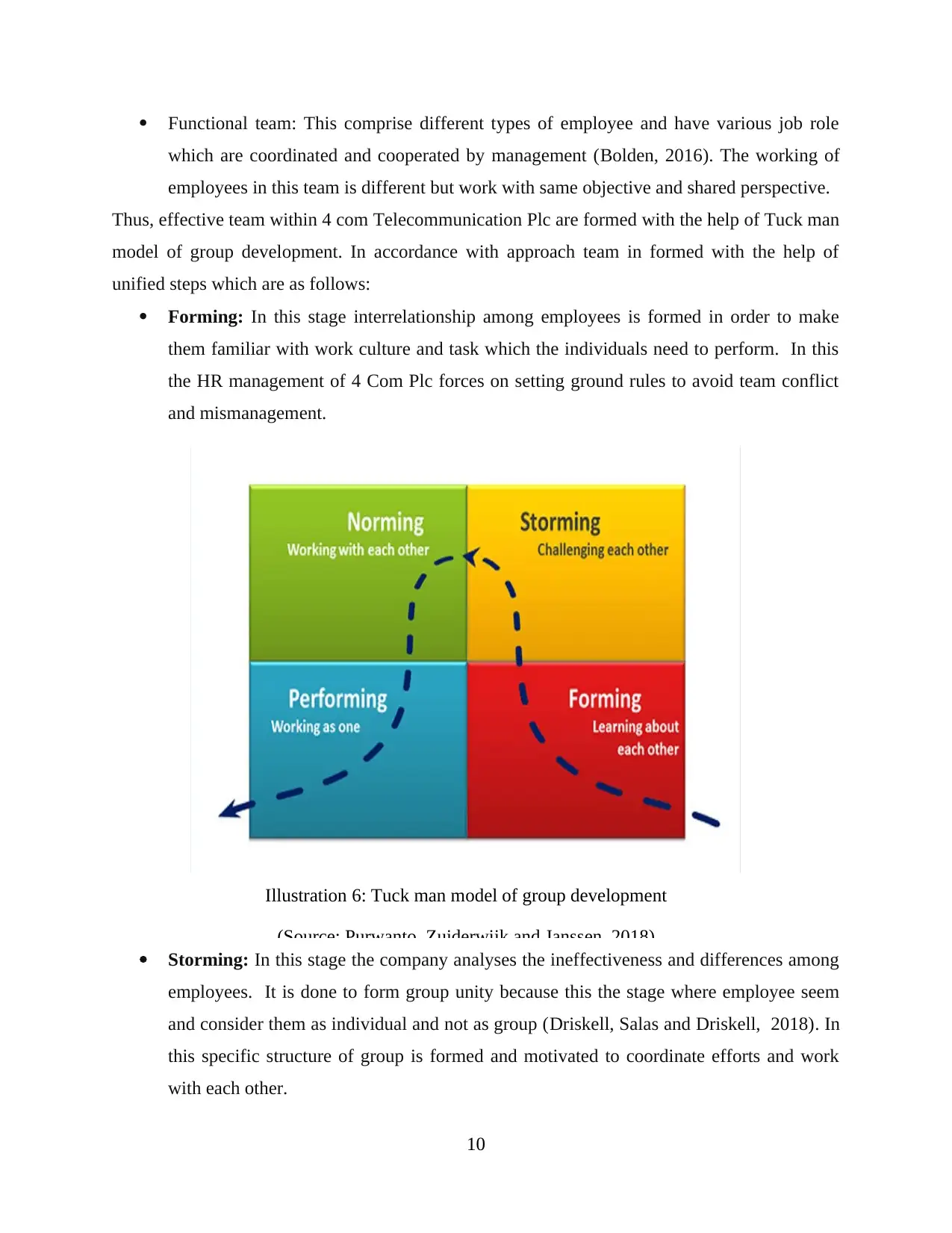
Functional team: This comprise different types of employee and have various job role
which are coordinated and cooperated by management (Bolden, 2016). The working of
employees in this team is different but work with same objective and shared perspective.
Thus, effective team within 4 com Telecommunication Plc are formed with the help of Tuck man
model of group development. In accordance with approach team in formed with the help of
unified steps which are as follows:
Forming: In this stage interrelationship among employees is formed in order to make
them familiar with work culture and task which the individuals need to perform. In this
the HR management of 4 Com Plc forces on setting ground rules to avoid team conflict
and mismanagement.
Storming: In this stage the company analyses the ineffectiveness and differences among
employees. It is done to form group unity because this the stage where employee seem
and consider them as individual and not as group (Driskell, Salas and Driskell, 2018). In
this specific structure of group is formed and motivated to coordinate efforts and work
with each other.
10
Illustration 6: Tuck man model of group development
(Source: Purwanto, Zuiderwijk and Janssen, 2018)
which are coordinated and cooperated by management (Bolden, 2016). The working of
employees in this team is different but work with same objective and shared perspective.
Thus, effective team within 4 com Telecommunication Plc are formed with the help of Tuck man
model of group development. In accordance with approach team in formed with the help of
unified steps which are as follows:
Forming: In this stage interrelationship among employees is formed in order to make
them familiar with work culture and task which the individuals need to perform. In this
the HR management of 4 Com Plc forces on setting ground rules to avoid team conflict
and mismanagement.
Storming: In this stage the company analyses the ineffectiveness and differences among
employees. It is done to form group unity because this the stage where employee seem
and consider them as individual and not as group (Driskell, Salas and Driskell, 2018). In
this specific structure of group is formed and motivated to coordinate efforts and work
with each other.
10
Illustration 6: Tuck man model of group development
(Source: Purwanto, Zuiderwijk and Janssen, 2018)
⊘ This is a preview!⊘
Do you want full access?
Subscribe today to unlock all pages.

Trusted by 1+ million students worldwide
1 out of 18
Related Documents
Your All-in-One AI-Powered Toolkit for Academic Success.
+13062052269
info@desklib.com
Available 24*7 on WhatsApp / Email
![[object Object]](/_next/static/media/star-bottom.7253800d.svg)
Unlock your academic potential
Copyright © 2020–2026 A2Z Services. All Rights Reserved. Developed and managed by ZUCOL.





